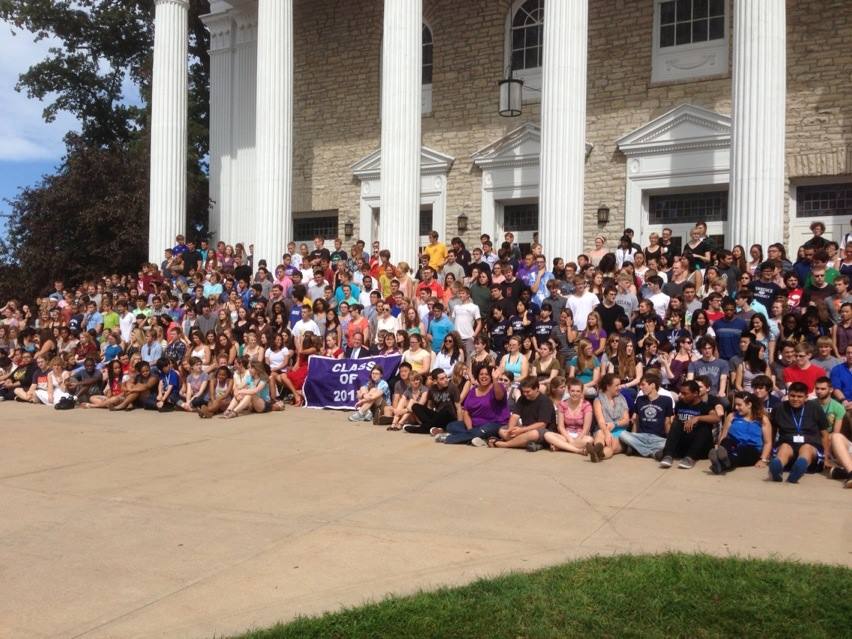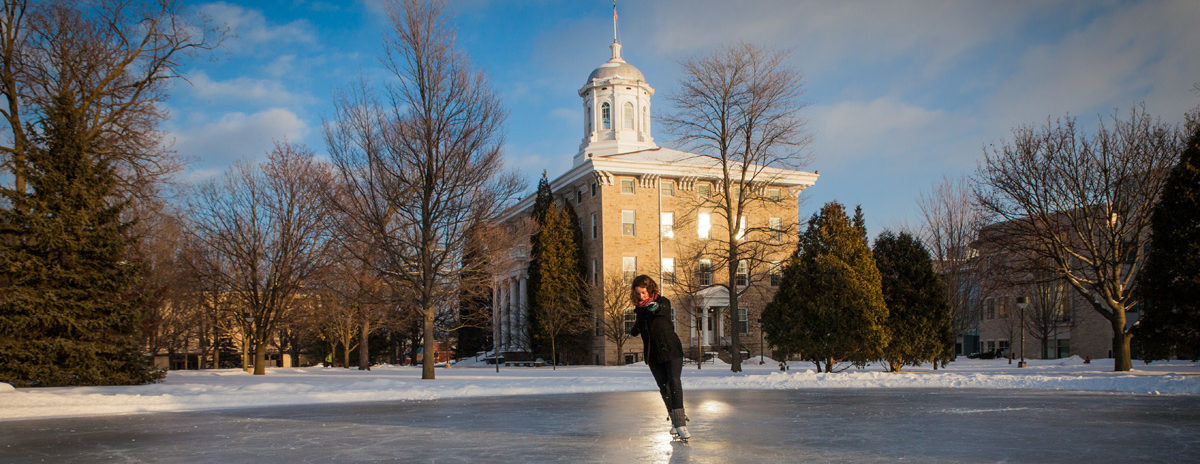Yesterday, September 10, we welcomed our newest class of students to Lawrence. For those of us in the admissions and financial aid offices who have worked with these students and their families for months (or even years), we get to experience a joy that might be on par with having our birthdays and favorite holidays all rolled into one event, because seeing the whole class together at the same time is like waking up to find 450 individual presents all waiting for us.
Today, the students all sat for their class photo on the southward-facing steps of Lawrence Memorial Chapel. This photo is always a blast, because it’s usually taken at 11:30 in the morning, and, if the weather is cooperating, like it did today, everyone is squinting right into the sun, like this:

If you look closely in the photo, you’ll notice that our new president, Mark Burstein, has joined his class of new Lawrentians for the photo. (Hint: he’s the fella in the tie behind the purple banner.)
Last night was our New Student Convocation. One of our traditions at this event is that the dean of admissions and financial aid (i.e., the guy writing this post) gets to introduce the class to itself. Below are some highlights about the class, which I shared with them and their families last night. You will see that they are, indeed, a nifty bunch.
OK, now I’ll turn my attention on our reason for being here… which is you. Let me tell you a little bit about yourselves:
The 400 or so of you who are first-year students represent one of the largest freshman classes in Lawrence University history. You have come to us from nearly 300 high schools and home schools. Worth noting is that 260 of you are the only ones from your school, which makes you the majority. So get out there and start meeting each other.
17 of you are transfer students who have come to us from colleges as near as the University of Wisconsin right here in the Fox Valley and as far away as Bronx Community College.
In addition to our degree-seeking freshmen and transfers who become Lawrentians today, 25 of you will be with us for just this year as part of visiting exchange programs in China, Spain, the Russian Federation, and Waseda University in Tokyo, Japan. We are happy that you are all here.
…
You hail from 30 states and 25 countries.
Our largest contingent—about a quarter of you—comes from our home state of Wisconsin. The next largest groups come from Illinois, Minnesota, California, New York, Colorado, Michigan, and Washington state.
About 10% of you have a parent, sibling, or some other relative who attended (or is currently attending) Lawrence. Some of you have several generations of Lawrentians in your family! That’s pretty exciting.
But here’s another exciting thing: about 10% of you are the first ones in your family to go to college.
A handful of you are so-called “non-traditional students,” in that you are either married, have children or graduated from high school a number of years ago.
…
You new Lawrentians have had an impressive array of experiences.
Some of you have overcome extraordinary health challenges, and the fact that you’re with us today as new college students is… well, the term “miraculous” is often overused, but not so in this case.
One of you has been educating Boston-area youth about food, farming, and hunger through a service-learning group you led.
One of you played the unwitting role of guinea pig in our new online deposit system when you tried, failed, tried, failed and finally succeeded in paying your deposit to attend Lawrence this fall.
One of you dazzled me and hundreds of other parents at the Einstein Middle School honors night last May with your saxophone solo on Pure Imagination from Willie Wonka.
One of you is a mother of three children between the ages of 7 and 11. Please allow me to introduce you to a room full of potential babysitters. [Note: This student sought me out later to tell me how her kids feel famous now!]
One of you shared with your Lawrence admission counselor that you knew the Lawrence University Honor Code word for word. And because we trusted you, we didn’t make you recite it.
One of you volunteers on a mushroom farm, and is particularly enamored with a glow-in-the-dark mushroom which you described as “cool but poisonous,” so you are trying to find ways to turn it into a jack-o-lantern or a night light.
One of you, a dedicated swimmer, would drive nearly two hours each way five times a week to train.
One of you created the Nerd Club at your high school, so that students who don’t feel they fit in elsewhere would have a club to join.
One of you founded a Dead Poets Society at your school in Amman, Jordan—so you could go beyond what you learned in class and even create your own works.
One of you is a world-class pentathlete (that’s fencing, swimming, show jumping, and a biathlon of pistol shooting and cross country running). You represented Team USA in Hungary and competed against athletes from 30 different countries.
One of you in this class of new Lawrentians happens to be the 16th president of Lawrence University.
It’s a great group of students, and they will do well here.
(P.S.: I look forward to seeing many of them at the Lawrence University football game vs. Lake Forest Saturday night.)



